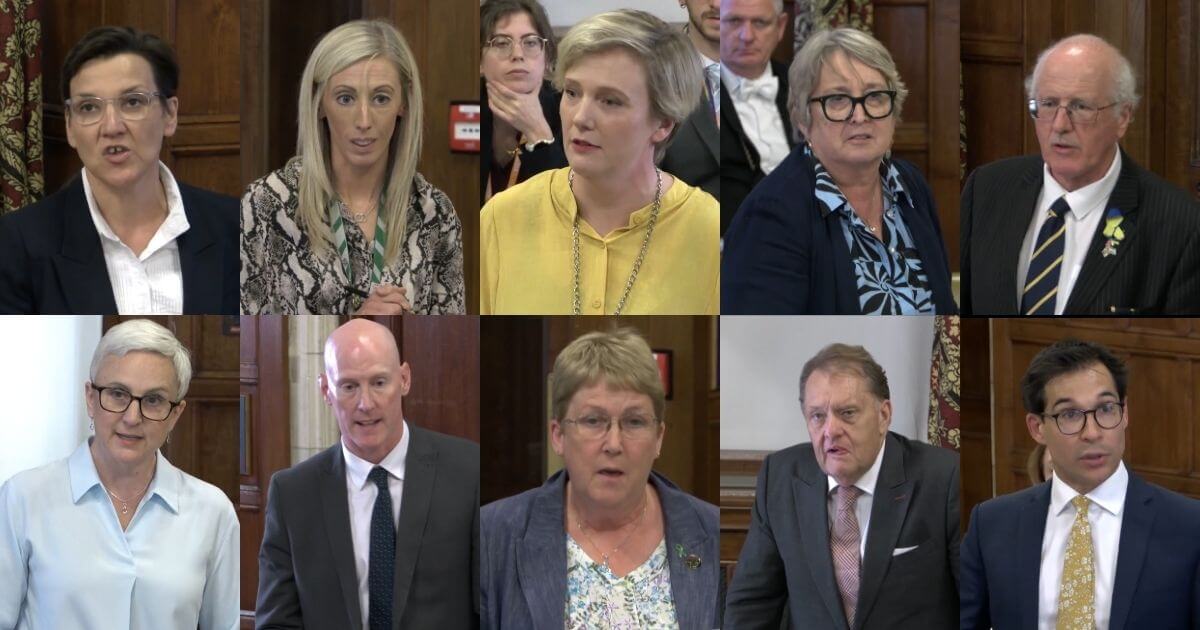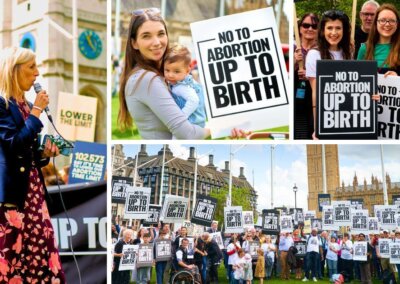During a debate on introducing extreme changes to our abortion laws, which would make it more likely that healthy babies are aborted at home for any reason, up to birth, pro-life MPs called for the repeal of the pills-by-post abortion scheme – the real cause of the rise in prosecutions for illegal abortions – and highlighted the consequences of the removal of abortion from the criminal law.
The Westminster Hall debate, which took place on Monday afternoon, was triggered by an online petition calling for “the UK government to remove abortion from criminal law”.
It took place shortly before Report Stage of the Crime and Policing Bill, to which Tonia Antoniazzi MP has added an amendment (NC1), the substance of which overlaps considerably with the e-petition.
Antoniazzi’s amendment would mean that “for the purposes of the law related to abortion… no offence is committed by a woman acting in relation to her own pregnancy”. As the amendment’s own explanatory statement makes clear, it would apply “at any gestation”, up to birth. It would change the law so it would no longer be illegal for women to perform their own abortions for any reason, and at any point up to and during birth.
This would make it more likely that healthy babies are aborted at home for any reason, up to birth.
Pills-by-post: the real reason for the increase in prosecutions for illegal abortions
A number of MPs pushing for the removal of abortion from the criminal law made reference to the small increase in the number of women being prosecuted for illegal abortions since 2022.
Tony Vaughan MP, who opened the debate, noted that three women had been convicted for illegal abortions from 1861 to 2022, but that since 2022, there had been an uptick in women being charged for abortion related offences. Fellow Labour MP, Stella Creasy also feigned puzzlement about this rise, saying “We have not been able to get to the bottom of why there has been such a surge”.
Lib Dem MP Christine Jardine also raised the same point without offering any explanation as to why.
However, the real cause of the, albeit relatively small, number of recent cases of illegal late-term abortions is the ‘pills-by-post’ scheme, which was supported by Tonia Antoniazzi, Diana Johnson, Stella Creasy, and leading abortion providers BPAS and MSI Reproductive Choices (Marie Stopes). DUP MP Carla Lockhart was clear on this point during the debate. The “pills-by-post scheme has enabled women, either dishonestly or because they have miscalculated their gestational age, to obtain abortion pills beyond the 10-week limit when at-home abortions are legal and considered safe for women -they are, of course, never safe for the baby -and even beyond the 24-week upper time limit for abortions in this country”.
“There is a clear alternative solution: end the pills-by-post scheme and reinstate in-person consultations”.
A likely increase in late-term abortions
Pro-life MPs argued that the e-petition calls on the government to, and NC1 would, remove offences that make it illegal for a woman to perform her own abortion at any point right through to birth. They do not outline circumstances in which it would continue to be an offence for a woman to perform her own abortion – the changes to the law would apply throughout all nine months of pregnancy and would not exclude sex-selective abortions.
This would be the biggest change to abortion legislation since the Abortion Act was introduced in 1967.
DUP MP Jim Shannon said “Depending on the model of decriminalisation, the effect could be wide enough to include de facto access to abortion for women up to the point of birth for any reason. There would, for example, be no enforceable prohibition on abortion on the basis of the sex of the unborn baby that would have criminal repercussions”.
Vaughan sought to downplay the number of late-term abortions, but the most recent stats show that in 2022, England and Wales saw 3,484 abortions at 20 weeks or later – an average of more than nine every single day.
Carla Lockhart pointed to New Zealand: “In reference to other countries, the hon. and learned Gentleman says that there is no evidence that decriminalisation will increase abortions. What is his response to the example of New Zealand, where abortion was decriminalised in March 2020, and in that year there was a 43% increase in late-term abortions, between 20 weeks gestation and birth, compared with 2019?”.
Return of in-person appointments
Carla Lockhart noted some of the dire consequences of abortion pills-by-post, including the more than 10,000 women “who took at least one abortion pill, provided by the NHS, at home in 2020 needed hospital treatment for side effects – equivalent to more than one in 17 women” and the Stuart Worby case in which a man poisoned a pregnant woman with abortion pills, obtained via pills-by-post causing her to lose her baby.
“All those cases could have been prevented if abortion providers had not lobbied, in the face of warnings about precisely those kinds of incidents occurring, for the removal of in-person appointments where health risks could be assessed and the woman’s identity and gestational age accurately verified. It is that last point about ensuring that a woman’s gestational age is accurately verified that has indirectly led to the debate we are having today” Lockhart said.
“There is a clear alternative solution: end the pills-by-post scheme and reinstate in-person consultations”.
Sir Edward Leigh warned that removing abortion from the criminal law de facto makes it possible to have an abortion at home up to birth
“One of the justifications for the Abortion Act 1967 was that it would end back-street abortions; indeed, whether we like it or not, we have abortion on demand in safe environments. If the proposals we are discussing go ahead and, de facto, it becomes possible to have an abortion at home up to birth, does he not think that could endanger women’s health? Is he not worried about that, or are the movers of the petition not worried about that?”.
Pro-abortion MPs concerned about Stella Creasy’s extreme abortion proposal
Even pro-abortion MPs such as Antoniazzi were concerned by Creasy’s proposed amendment. Antoniazzi said Creasy’s “new clause is markedly broader in terms of the scope of change proposed to the long-standing settlement that provides for abortion services. This framework is complex”.
“I have concerns about overturning that entire framework at the current time and replacing it with a mechanism that would leave power in the hands of a single Minister. Does the Minister agree that such powers would mark a sea change in the long-standing, underlying framework that provides for abortion in England and Wales?”
Sadik Al-Hassan claimed that England and Wales “have the harshest punishment in the world for illegal abortion: life imprisonment”. However, this ignores the fact that the suspended sentence ultimately given to Carla Foster has likely set a precedent that means that custodial sentences may well now be unlikely for similar future cases.











